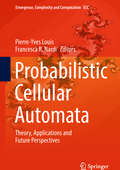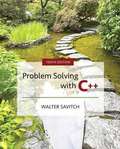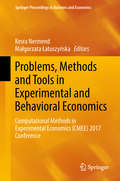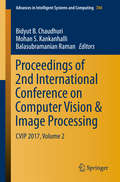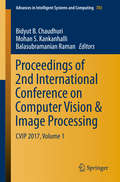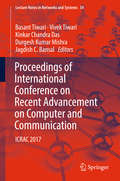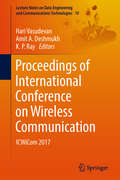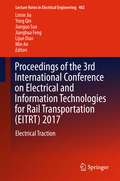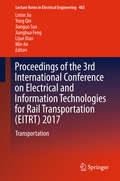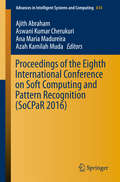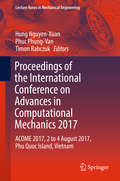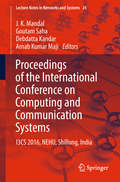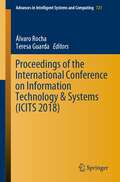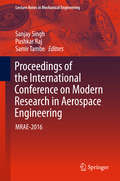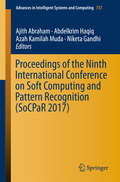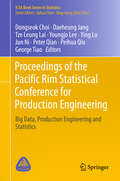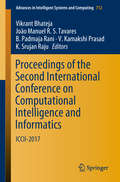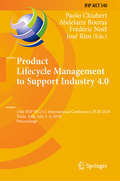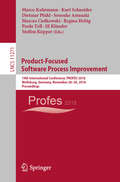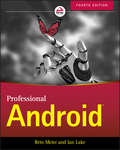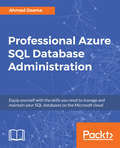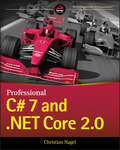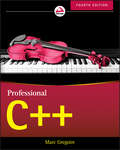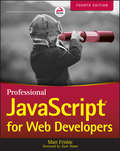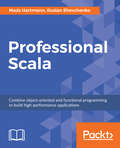- Table View
- List View
Probabilistic Cellular Automata: Theory, Applications And Future Perspectives (Emergence, Complexity And Computation Ser. #27)
by Pierre-Yves Louis Francesca R. NardiThis book explores Probabilistic Cellular Automata (PCA) from the perspectives of statistical mechanics, probability theory, computational biology and computer science. PCA are extensions of the well-known Cellular Automata models of complex systems, characterized by random updating rules. Thanks to their probabilistic component, PCA offer flexible computing tools for complex numerical constructions, and realistic simulation tools for phenomena driven by interactions among a large number of neighboring structures. PCA are currently being used in various fields, ranging from pure probability to the social sciences and including a wealth of scientific and technological applications. This situation has produced a highly diversified pool of theoreticians, developers and practitioners whose interaction is highly desirable but can be hampered by differences in jargon and focus. This book – just as the workshop on which it is based – is an attempt to overcome these difference and foster interest among newcomers and interaction between practitioners from different fields. It is not intended as a treatise, but rather as a gentle introduction to the role and relevance of PCA technology, illustrated with a number of applications in probability, statistical mechanics, computer science, the natural sciences and dynamical systems. As such, it will be of interest to students and non-specialists looking to enter the field and to explore its challenges and open issues.
Problem Solving With C++ (Tenth Edition)
by Walter Savitch Kenrick MockNow in its 10th Edition, Problem Solving with C++ is written for the beginning programmer. The text cultivates strong problem-solving skills and programming techniques as it introduces readers to the C++ programming language. Author Walt Savitch's approach to programming emphasizes active reading through the use of well-placed examples and self-tests, while flexible coverage means the order of chapters and sections can easily be adapted without sacrificing continuity. Savitch's clear, concise style is a hallmark feature of the text and is supported by a suite of tried-and-true pedagogical tools. The 10th Edition includes ten new Programming Projects, along with new discussions and revisions.
Problems, Methods and Tools in Experimental and Behavioral Economics: Computational Methods in Experimental Economics (CMEE) 2017 Conference (Springer Proceedings in Business and Economics)
by Kesra Nermend Małgorzata ŁatuszyńskaThese proceedings highlight research on the latest trends and methods in experimental and behavioral economics. Featuring contributions presented at the 2017 Computational Methods in Experimental Economics (CMEE) conference, which was held in Lublin, Poland, it merges findings from various domains to present deep insights into topics such as game theory, decision theory, cognitive neuroscience and artificial intelligence. The fields of experimental economics and behavioral economics are rapidly evolving. Modern applications of experimental economics require the integration of know-how from disciplines including economics, computer science, psychology and neuroscience. The use of computer technology enhances researchers’ ability to generate and analyze large amounts of data, allowing them to use non-standard methods of data logging for experiments such as cognitive neuronal methods. Experiments are currently being conducted with software that, on the one hand, provides interaction with the people involved in experiments, and on the other helps to accurately record their responses. The goal of the CMEE conference and the papers presented here is to provide the scientific community with essential research on and applications of computer methods in experimental economics. Combining theories, methods and regional case studies, the book offers a valuable resource for all researchers, scholars and policymakers in the areas of experimental and behavioral economics.
Proceedings of 2nd International Conference on Computer Vision & Image Processing: Cvip 2017, Volume 1 (Advances In Intelligent Systems And Computing #703)
by Mohan S. Kankanhalli Balasubramanian Raman Bidyut B. ChaudhuriThe book provides insights into the Second International Conference on Computer Vision & Image Processing (CVIP-2017) organized by Department of Computer Science and Engineering of Indian Institute of Technology Roorkee. The book presents technological progress and research outcomes in the area of image processing and computer vision. The topics covered in this book are image/video processing and analysis; image/video formation and display; image/video filtering, restoration, enhancement and super-resolution; image/video coding and transmission; image/video storage, retrieval and authentication; image/video quality; transform-based and multi-resolution image/video analysis; biological and perceptual models for image/video processing; machine learning in image/video analysis; probability and uncertainty handling for image/video processing; motion and tracking; segmentation and recognition; shape, structure and stereo.
Proceedings of 2nd International Conference on Computer Vision & Image Processing: Cvip 2017, Volume 2 (Advances In Intelligent Systems And Computing #704)
by Mohan S. Kankanhalli Balasubramanian Raman Bidyut B. ChaudhuriThe book provides insights into the Second International Conference on Computer Vision & Image Processing (CVIP-2017) organized by Department of Computer Science and Engineering of Indian Institute of Technology Roorkee. The book presents technological progress and research outcomes in the area of image processing and computer vision. The topics covered in this book are image/video processing and analysis; image/video formation and display; image/video filtering, restoration, enhancement and super-resolution; image/video coding and transmission; image/video storage, retrieval and authentication; image/video quality; transform-based and multi-resolution image/video analysis; biological and perceptual models for image/video processing; machine learning in image/video analysis; probability and uncertainty handling for image/video processing; motion and tracking; segmentation and recognition; shape, structure and stereo.
Proceedings of International Conference on Recent Advancement on Computer and Communication: Icrac 2017 (Lecture Notes In Networks And Systems #34)
by Durgesh Kumar Mishra Basant Tiwari Vivek Tiwari Kinkar Chandra Das Jagdish C. BansalThe book is a compilation of best papers presented at International Conference on Recent Advancement in Computer and Communication (ICRAC 2017) organized by IMPLab Research and Innovation Foundation, Bhopal, India. The book covers all aspects of computers and communication techniques including pervasive computing, distributed computing, cloud computing, sensor and adhoc network, image, text and speech processing, pattern recognition and pattern analysis, digital signal processing, digital electronics, telecommunication technologies, robotics, VLSI technologies, embedded system, satellite communication, digital signal processing, and digital communication. The papers included are original research works of experts from industry, government centers and academic institutions; experienced in engineering, design and research.
Proceedings of International Conference on Wireless Communication: Icwicom 2017 (Lecture Notes On Data Engineering And Communications Technologies #19)
by Hari Vasudevan Amit A. Deshmukh K. P. RayThe volume comprises best selected papers presented at International Conference on Wireless Communication (ICWiCOM) which is organized by Department of Electronics and Telecommunication Engineering of D J Sanghvi College of Engineering. The volume focusses on narrowed topics of wireless communication like signal and image processing applicable to wireless domain, networking, microwave and antenna designs, tele-medicine systems, etc. The papers are divided into three main domains like, networking, antenna designs and embedded systems applicable to the communication domain. The content will be helpful for Post-Graduate and Doctoral students in their research.
Proceedings of the 3rd International Conference on Electrical and Information Technologies for Rail Transportation: Electrical Traction (Lecture Notes In Electrical Engineering #482)
by Limin Jia Yong Qin Lijun Diao Jianghua Feng Min An Jianguo SuoThe proceedings collect the latest research trends, methods and experimental results in the field of electrical and information technologies for rail transportation. The topics cover novel traction drive technologies of rail transportation, safety technology of rail transportation system, rail transportation information technology, rail transportation operational management technology, rail transportation cutting-edge theory and technology etc. The proceedings can be a valuable reference work for researchers and graduate students working in rail transportation, electrical engineering and information technologies.
Proceedings of the 3rd International Conference on Electrical and Information Technologies for Rail Transportation: Electrical Traction (Lecture Notes In Electrical Engineering #482)
by Limin Jia Yong Qin Lijun Diao Jianghua Feng Min An Jianguo SuoThe proceedings collect the latest research trends, methods and experimental results in the field of electrical and information technologies for rail transportation. The topics cover novel traction drive technologies of rail transportation, safety technology of rail transportation system, rail transportation information technology, rail transportation operational management technology, rail transportation cutting-edge theory and technology etc. The proceedings can be a valuable reference work for researchers and graduate students working in rail transportation, electrical engineering and information technologies.
Proceedings of the Eighth International Conference on Soft Computing and Pattern Recognition (SoCPaR #2016)
by Ajith Abraham Azah Kamilah Muda Ana Maria Madureira Aswani Kumar CherukuriThis volume presents 70 carefully selected papers from a major joint event: the 8th International Conference on Soft Computing and Pattern Recognition (SoCPaR 2016) and the 8th International Conference on Computational Aspects of Social Networks (CASoN 2016). SoCPaR–CASoN 2016, which was organized by the Machine Intelligence Research Labs (MIR Labs), USA and Vellore Institute of Technology (VIT), India and held at the VIT on December 19–21, 2016. It brings together researchers and practitioners from academia and industry to share their experiences and exchange new ideas on all interdisciplinary areas of soft computing and pattern recognition, as well as intelligent methods applied to social networks.This book is a valuable resource for practicing engineers/scientists and researchers working in the field of soft computing, pattern recognition and social networks.
Proceedings of the International Conference on Advances in Computational Mechanics 2017: Acome 2017, 2 To 4 August 2017, Phu Quoc Island, Vietnam (Lecture Notes In Mechanical Engineering)
by Hung Nguyen-Xuan Phuc Phung-Van Timon RabczukThis book provides an overview of state-of-the-art methods in computational engineering for modeling and simulation.This proceedings volume includes a selection of refereed papers presented at the International Conference on Advances in Computational Mechanics (ACOME) 2017, which took place on Phu Quoc Island, Vietnam on August 2-4, 2017.The contributions highlight recent advances in and innovative applications of computational mechanics. Subjects covered include: biological systems; damage, fracture and failure; flow problems; multiscale multiphysics problems; composites and hybrid structures; optimization and inverse problems; lightweight structures; computational mechatronics; computational dynamics; numerical methods; and high-performance computing.The book is intended for academics, including graduate students and experienced researchers interested in state-of-the-art computational methods for solving challenging problems in engineering.
Proceedings of the International Conference on Computing and Communication Systems: I3cs 2016, Nehu, Shillong, India (Lecture Notes In Networks And Systems #24)
by J. K. Mandal Goutam Saha Debdatta Kandar Arnab Kumar MajiThe volume contains latest research work presented at International Conference on Computing and Communication Systems (I3CS 2016) held at North Eastern Hill University (NEHU), Shillong, India. The book presents original research results, new ideas and practical development experiences which concentrate on both theory and practices. It includes papers from all areas of information technology, computer science, electronics and communication engineering written by researchers, scientists, engineers and scholar students and experts from India and abroad.
Proceedings of the International Conference on Information Technology & Systems (Advances In Intelligent Systems And Computing #721)
by Álvaro Rocha Teresa GuardaThis book includes a selection of articles from the 2018 International Conference on Information Technology & Systems (ICITS 18), held on January 10 - 12, 2018, at the Universidad Estatal Pen#65533;nsula de Santa Elena, Libertad City, Ecuador. ICIST is a global forum for researchers and practitioners to present and discuss recent findings and innovations, current trends, lessons learned and the challenges of modern information technology and systems research, together with their technological development and applications. The main topics covered include information and knowledge management; organizational models and information systems; software and systems modeling; software systems, architectures, applications and tools; multimedia systems and applications; computer networks, mobility and pervasive systems; intelligent and decision support systems; big data analytics and applications; human-computer interaction; ethics, computers & security; health informatics; and information technologies in education.
Proceedings of the International Conference on Modern Research in Aerospace Engineering
by Sanjay Singh Pushkar Raj Samir TambeThis book includes high-quality research papers presenting the latest advances in aerospace and related engineering fields. The papers are organized according to six broad areas (i) Aerospace Propulsion, (ii) Space Research, Avionics and Instrumentation, (iii) Aerodynamics Wind Tunnel and Computational fluid dynamics (CFD), (iv) Structural Analysis and Finite Element Method (FEM), (v) Materials, Manufacturing and Air Safety and (vi) Aircraft Environmental and Control System and Stability, making it easy for readers to find the information they require. Offering insights into the state of the art in aerospace engineering, the original research presented is valuable to academics, researchers, undergraduate and postgraduate students as well as professionals in industry and R&D. The clearly written book can be used for the validation of data, and the development of experimental and simulation techniques as well as other mathematical approaches.
Proceedings of the Ninth International Conference on Soft Computing and Pattern Recognition (Advances In Intelligent Systems And Computing #737)
by Ajith Abraham Azah Kamilah Muda Abdelkrim Haqiq Niketa GandhiThis book presents 18 carefully selected papers from the ninth edition of the International Conference on Soft Computing and Pattern Recognition (SoCPaR 2017), which was held in Marrakesh, Morocco from December 11 to 13, 2017. A premier conference in the Soft Computing field, SoCPaR brings together the world’s leading researchers and practitioners interested in advancing the state of the art in Soft Computing and Pattern Recognition, allowing them to exchange notes on a broad range of disciplines. The book offers a valuable reference guide for all researchers, students and practitioners in the fields of Computer Science and Engineering.
Proceedings of the Pacific Rim Statistical Conference for Production Engineering: Big Data, Production Engineering And Statistics (ICSA Book Series in Statistics)
by Tze Leung Lai Jun Ni Ying Lu Youngjo Lee Dongseok Choi Daeheung Jang Peter Qian Peihua Qiu George TiaoThis book presents the proceedings of the 2nd Pacific Rim Statistical Conference for Production Engineering: Production Engineering, Big Data and Statistics, which took place at Seoul National University in Seoul, Korea in December, 2016. The papers included discuss a wide range of statistical challenges, methods and applications for big data in production engineering, and introduce recent advances in relevant statistical methods.
Proceedings of the Second International Conference on Computational Intelligence and Informatics: ICCII 2017 (Advances in Intelligent Systems and Computing #712)
by Vikrant Bhateja K. Srujan Raju V. Kamakshi Prasad B. Padmaja Rani João Manuel TavaresThe volume contains 69 high quality papers presented at International Conference on Computational Intelligence and Informatics (ICCII 2017). The conference was held during 25-27, September, 2017 at Department of Computer Science and Engineering, JNTUHCEH, Hyderabad, Telangana, India. This volume contains papers mainly focused on data mining, wireless sensor networks, parallel computing, image processing, network security, MANETS, natural language processing, and internet of things.
Product Lifecycle Management to Support Industry 4.0: 15th Ifip Wg 5. 1 International Conference, Plm 2018, Turin, Italy, July 2-4, 2018, Proceedings (IFIP Advances in Information and Communication Technology #540)
by Abdelaziz Bouras José Ríos Paolo Chiabert Frédéric NoëlThis book constitutes the refereed post-conference proceedings of the 15th IFIP WG 5.1 International Conference on Product Lifecycle Management, PLM 2018, held in Turin, Spain, in July 2018.The 72 revised full papers presented were carefully reviewed and selected from 82 submissions. The papers are organized in the following topical sections: building information modeling; collaborative environments and new product development; PLM for digital factories and cyber physical systems; ontologies and data models; education in the field of industry 4.0; product-service systems and smart products; lean organization for industry 4.0; knowledge management and information sharing; PLM infrastructure and implementation; PLM maturity, implementation and adoption; 3D printing and additive manufacturing; and modular design and products and configuration and change management.
Product-Focused Software Process Improvement: 19th International Conference, PROFES 2018, Wolfsburg, Germany, November 28–30, 2018, Proceedings (Lecture Notes in Computer Science #11271)
by Kurt Schneider Marco Kuhrmann Sousuke Amasaki Dietmar Pfahl Marcus Ciolkowski Regina Hebig Paolo Tell Jil Klünder Steffen KüpperThis book constitutes the refereed proceedings of the 19th International Conference on Product-Focused Software Process Improvement, PROFES 2018, held in Wolfsburg, Germany, in November 2018.The 16 revised full papers and 8 short papers presented together with 10 workshop papers and 2 industry talks were carefully reviewed and selected from 65 submissions. The papers are organized in the following topical sections: processes and methods; empirical studies in industry; testing; measuremene and monitoring; and global software engineering and scaling. Further relevant topics were added by the events co-located with PROFES 2018, the Second International Workshop on Managing Quality in Agile and Rapid Software Development Processes (QUASD) and the Third Workshop on Hybrid Software and System Development Approaches (HELENA).
Professional Android
by Reto Meier Ian LakeThe comprehensive developer guide to the latest Android features and capabilities Professional Android, 4th Edition shows developers how to leverage the latest features of Android to create robust and compelling mobile apps. This hands-on approach provides in-depth coverage through a series of projects, each introducing a new Android platform feature and highlighting the techniques and best practices that exploit its utmost functionality. The exercises begin simply, and gradually build into advanced Android development. Clear, concise examples show you how to quickly construct real-world mobile applications. This book is your guide to smart, efficient, effective Android development. Learn the best practices that get more out of Android Understand the anatomy, lifecycle, and UI metaphor of Android apps Design for all mobile platforms, including tablets Utilize both the Android framework and Google Play services
Professional Azure SQL Database Administration: Equip yourself with the skills you need to manage and maintain your SQL databases on the Microsoft cloud
by Ahmad OsamaDiscover how you can migrate a traditional on-premise SQL server database to a cloud-based solution with Microsoft Azure. Built with database administrators in mind, this book emulates different scenarios you might come across while working with large, complex SQL database migrations and provides solutions for effectively managing the migrated databases.Key FeaturesImplement backup, restore, and recovery of Azure SQL databasesCreate shards and elastic pools to scale Azure SQL databasesAutomate common management tasks with PowerShellImplement over 40 practical activities and exercises across 24 topics to reinforce your learningBook DescriptionAs the cloud version of SQL Server, Azure SQL Database differs in key ways when it comes to management, maintenance, and administration. It’s important to know how to administer SQL Database to fully benefit from all of the features and functionality that it provides. This book addresses important aspects of an Azure SQL Database instance such as migration, backup restorations, pricing policies, security, scalability, monitoring, performance optimization, high availability, and disaster recovery. It is a complete guide for database administrators, and ideal for those who are planning to migrate from on premise SQL Server database to an Azure SQL Server database.What you will learnLearn how to provision a new database or migrate an existing on-premise solutionUnderstand how to backup, restore, secure, and scale your own Azure SQL DatabaseOptimize the performance by monitoring and tuning your cloud-based SQL instanceImplement high availability and disaster recovery procedures with SQL DatabaseDevelop a roadmap for your own scalable cloud solution with Azure SQL DatabaseWho this book is forThis book is ideal for database administrators, database developers, or application developers who are interested in developing or migrating existing applications with Azure SQL Database. Prior experience of working with an on-premise SQL Server deployment and brief knowledge of PowerShell and C# are recommended prerequisites.
Professional C# 7 and .NET Core 2.0
by Christian NagelThe professional’s guide to C# 7, with expert guidance on the newest features Professional C# 7 and .NET Core 2.0 provides experienced programmers with the information they need to work effectively with the world’s leading programming language. The latest C# update added many new features that help you get more done in less time, and this book is your ideal guide for getting up to speed quickly. C# 7 focuses on data consumption, code simplification, and performance, with new support for local functions, tuple types, record types, pattern matching, non-nullable reference types, immutable types, and better support for variables. Improvements to Visual Studio will bring significant changes to the way C# developers interact with the space, bringing .NET to non-Microsoft platforms and incorporating tools from other platforms like Docker, Gulp, and NPM. Guided by a leading .NET expert and steeped in real-world practicality, this guide is designed to get you up to date and back to work. With Microsoft speeding up its release cadence while offering more significant improvement with each update, it has never been more important to get a handle on new tools and features quickly. This book is designed to do just that, and more—everything you need to know about C# is right here, in the single-volume resource on every developer’s shelf. Tour the many new and enhanced features packed into C# 7 and .NET Core 2.0 Learn how the latest Visual Studio update makes developers’ jobs easier Streamline your workflow with a new focus on code simplification and performance enhancement Delve into improvements made for localization, networking, diagnostics, deployments, and more Whether you’re entirely new to C# or just transitioning to C# 7, having a solid grasp of the latest features allows you to exploit the language’s full functionality to create robust, high -quality apps. Professional C# 7 and .NET Core 2.0 is the one-stop guide to everything you need to know.
Professional C++
by Marc GregoireGet up to date quickly on the new changes coming with C++17 Professional C++ is the advanced manual for C++ programming. Designed to help experienced developers get more out of the latest release, this book skims over the basics and dives right in to exploiting the full capabilities of C++17. Each feature is explained by example, each including actual code snippets that you can plug into your own applications. Case studies include extensive, working code that has been tested on Windows and Linux, and the author's expert tips, tricks, and workarounds can dramatically enhance your workflow. Even many experienced developers have never fully explored the boundaries of the language's capabilities; this book reveals the advanced features you never knew about, and drills down to show you how to turn these features into real-world solutions. The C++17 release includes changes that impact the way you work with C++; this new fourth edition covers them all, including nested namespaces, structured bindings, string_view, template argument deduction for constructors, parallel algorithms, generalized sum algorithms, Boyer-Moore string searching, string conversion primitives, a filesystem API, clamping values, optional values, the variant type, the any type, and more. Clear explanations and professional-level depth make this book an invaluable resource for any professional needing to get up to date quickly. Maximize C++ capabilities with effective design solutions Master little-known elements and learn what to avoid Adopt new workarounds and testing/debugging best practices Utilize real-world program segments in your own applications C++ is notoriously complex, and whether you use it for gaming or business, maximizing its functionality means keeping up to date with the latest changes. Whether these changes enhance your work or make it harder depends on how well-versed you are in the newest C++ features. Professional C++ gets you up to date quickly, and provides the answers you need for everyday solutions.
Professional JavaScript for Web Developers
by Matt FrisbieUpdate your skill set for ES 6 and 7 with the ultimate JavaScript guide for pros Professional JavaScript for Web Developers is the essential guide to next-level JavaScript development. Written for intermediate-to-advanced programmers, this book jumps right into the technical details to help you clean up your code and become a more sophisticated JavaScript developer. From JavaScript-specific object-oriented programming and inheritance, to combining JavaScript with HTML and other markup languages, expert instruction walks you through the fundamentals and beyond. This new fourth edition has been updated to cover ECMAScript 6 and 7 (also known as ES2015 and ES2016) and the major re-imagination and departure from ES 5.1; new frameworks and libraries, new techniques, new testing tools, and more are explained in detail for the professional developer, with a practical focus that helps you put your new skills to work on real-world projects. The latest—and most dramatic—ES release is already being incorporated into JavaScript engines in major browsers; this, coupled with the rise in mobile web traffic increasing demand for responsive, dynamic web design, means that all web developers need to update their skills—and this book is your ideal resource for quick, relevant guidance. Get up to date with ECMAScript 6 and 7, new frameworks, and new libraries Delve into web animation, emerging APIs, and build systems Test more effectively with mocks, unit tests, functional tests, and other tools Plan your builds for future ES releases Even if you think you know JavaScript, new ES releases bring big changes that will affect the way you work. For a professional-level update that doesn't waste time on coding fundamentals, Professional JavaScript for Web Developers is the ultimate resource to bring you up to speed.
Professional Scala: Combine object-oriented and functional programming to build high-performance applications
by Mads Hartmann Ruslan ShevchenkoIf your application source code is overly verbose, it can be a nightmare to maintain. Write concise and expressive, type-safe code in an environment that lets you build for the JVM, browser, and more.Key FeaturesExpert guidance that shows you to efficiently use both object-oriented and functional programming techniquesUnderstand functional programming libraries, such as Cats and Scalaz, and use them to augment your Scala developmentPerfectly balances theory and hands-on exercises, assessments, and activitiesBook DescriptionThis book teaches you how to build and contribute to Scala programs, recognizing common patterns and techniques used with the language. You’ll learn how to write concise, functional code with Scala. After an introduction to core concepts, syntax, and writing example applications with scalac, you’ll learn about the Scala Collections API and how the language handles type safety via static types out-of-the-box. You’ll then learn about advanced functional programming patterns, and how you can write your own Domain Specific Languages (DSLs). By the end of the book, you’ll be equipped with the skills you need to successfully build smart, efficient applications in Scala that can be compiled to the JVM.What you will learnUnderstand the key language syntax and core concepts for application developmentMaster the type system to create scalable type-safe applications while cutting down your time spent debuggingUnderstand how you can work with advanced data structures via built-in features such as the Collections libraryUse classes, objects, and traits to transform a trivial chatbot program into a useful assistantUnderstand what are pure functions, immutability, and higher-order functionsRecognize and implement popular functional programming design patternsWho this book is forThis is an ideal book for developers who are looking to learn Scala, and is particularly well suited for Java developers looking to migrate across to Scala for application development on the JVM.
